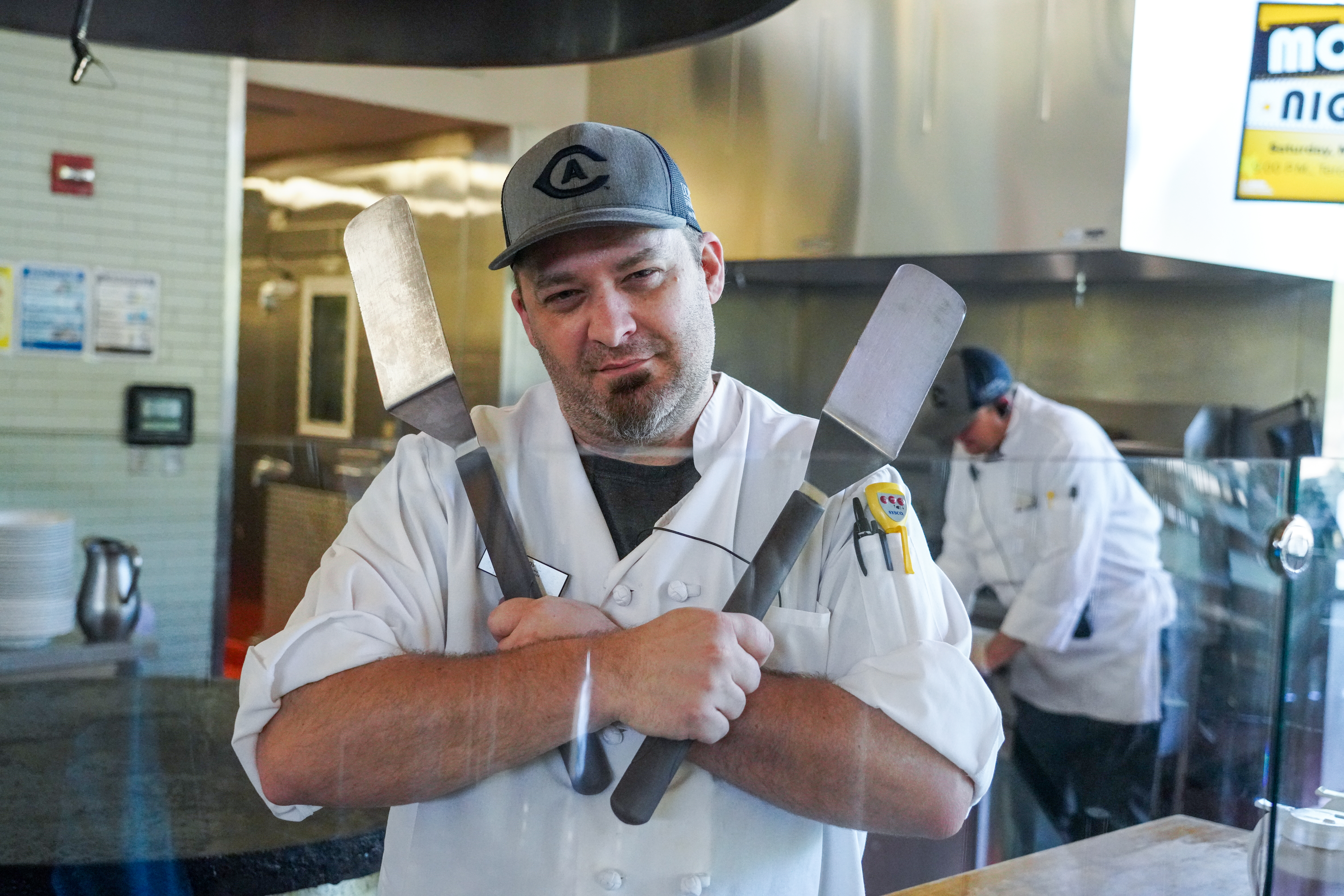Justin Ridgway shares his view of the Segundo Dining Commons from the Pacific Fusion station and beyond
By UMAIMA EJAZ — features@theaggie.org
Justin Ridgway serves over 1,000 students every day at one of the busiest platforms at Segundo Dining Commons: Pacific Fusion. The lines are often so long that they can be the first thing you see when you enter Segundo Dining Commons (DC). But despite the popularity of his food, Ridgway said he sometimes feels “invisible” to the people who eat it.
In 2002, Ridgway, who was 21 at the time, was working at Toys“R”Us, a well-known toy and children’s store. But one job wasn’t enough for him to make ends meet, so he applied to Fulton Pribe Ribs — and the job changed the next 20 years of his life.
Ridgway used to visit his best friend Jacob Carriker at Fulton Prime Ribs in Old Sacramento every night after work, and it was there that he found his first kitchen job as a dishwasher.
Over the course of the last two decades, Ridgway has loved working in the kitchen industry, even throughout the most difficult periods. He said that as a service worker, his life hasn’t always been easy. He has more often than not found himself working two jobs, and has at times felt constant worry about his workplace closing or losing benefits like health insurance.
“Even today, when I think about it, I wish chefs or cooks — who are skilled laborers — were able to be paid more than just what a lot of entry level positions pay,” Ridgway said.
He noted that these jobs are the foundation of many aspects of the food industry, arguing that although the food service sector has come a long way, there is still much to be improved.
Right after high school, Ridgway enrolled into the U.S. military for two years, during which time he was mainly stationed on the East Coast. He said that throughout his career, he hasn’t felt that not having a college degree has really impacted him.
“Whenever I start looking for another job, it does seem like there’s an emphasis put on a degree,” Ridgway said. “Yet everyone I’ve worked with who’s had a degree in something is less efficient in their job than people who have been actually working in it for a while. Service workers are just overlooked despite our hard work.”
In some of the roles he’s had during his time as a chef, his days would start as early as 4:30 a.m. He said that at those times, his daughter, Avienda, was usually still asleep when he left in the morning, so he’d quietly just stand and watch her.
“I wouldn’t get much time with my daughter then,” Ridgway said. “But whatever I got was enough. I remember one morning, looking at her while she slept — she was about one and a half at that time — she threw all of her blankets out of her crib and pulled her pillowcase off her pillow and crawled into it like a sleeping bag. It was adorable.”
Ridgway said that in addition to the long hours, working in the food service industry can also be dangerous. The equipment in a commercial kitchen has a lot of potential to be dangerous if interacted with in an improper way. Ridgway recalled one occasion on which he was asked to clean a panini press that had never been cleaned before at a cafe he used to work at. The proper tool wasn’t available, and he had to use a spatula to chisel the char out of it.
“A piece flew off and fluid hit me directly in my pupil,” Ridgway said. “No severe damage, but I had trouble seeing that day just because my eyes were watering so much.”
He said that he has suffered numerous other burns and cuts as well.
“I’ve had the fingerprints on my left hand burnt off for a month because someone handed me a mixing bowl that had been sitting over a pilot light,” Ridgway said. “But these were all at other places. I haven’t really had any injuries [at Segundo DC].”
But Ridgway said that the most discouraging aspects of having this kind of job aren’t the potential physical hazards — It’s the feeling that no matter how hard you’re working, the effort you’re personally putting in isn’t really ever recognized.
“The most negative thing is that it feels, especially coming from the students, that we’re invisible,” Ridgway said. “They either just completely ignore us, or — very rarely — we’ll have people talking down to us because we’re in a service position.”
Robert Cutts, 43, another chef who has been working at the Segundo DC for 15 years, said that he loves his work, but Ridgway often makes it more fun.
“Justin always has some riddles or he’s always got something to talk about,” Cutts said. “He’s an intelligent guy. I enjoy his presence while doing what I love, and nothing else matters.”
Twenty years into his culinary career, Justin might have made new friends but is still in touch with the ones he first started with.
Jacob Carriker, Justin’s liaison to the food service industry and best friend of 20 years, remembers their nights as young adults playing “Magic: The Gathering,” cooking and drinking beer. A lot has changed since then, but both of them have been in the culinary field together until today. Carriker said that he believes the food industry is challenging to work in, but Ridgway is someone who is great at the work.
“It just takes a different kind of mindset to do this for a living,” Carriker said. “Not everybody has what it takes, and I think Justin has proven that he does.”
Written by: Umaima Ejaz — features@theaggie.org




